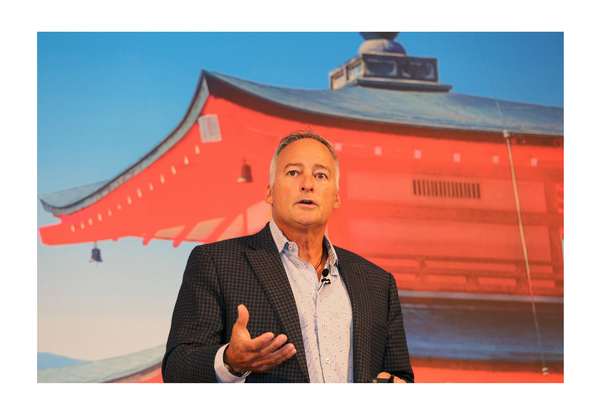Egg Industry Announces Commitment to United Nation’s Sustainable Development Goals
Published: September 12, 2018
By: https://www.internationalegg.com/
 In Kyoto, the World Egg Organisation (WEO) announced the global egg industry’s pledge to work in partnership with the United Nations, to fulfill its Sustainable Development Goals (SDGs).
In Kyoto, the World Egg Organisation (WEO) announced the global egg industry’s pledge to work in partnership with the United Nations, to fulfill its Sustainable Development Goals (SDGs).The UN’s SDGs represent a shared vision to eradicate poverty and social inequality, and to tackle climate change by 2030. A social contract between the world’s leaders, the successful delivery of this ambitious blueprint is dependent on engagement and participation from international industry. The WEO has outlined key areas where it is delivering positive outcomes in line with the UN’s targets.
Of the UN’s 17 goals to transform our world, the WEO has identified six primary objectives where the egg industry is already making a significant impact through a range of dedicated sustainability initiatives. These specifically address the following goals:
Zero Hunger
Eggs are a sustainable, affordable source of the highest quality protein for everyone. Through its charitable work, the International Egg Foundation (IEF) is tackling food poverty experienced in developing countries, such as Swaziland and Uganda, through an ever-broadening range of community-based programmes.
Good Health and Wellbeing
Eggs fulfill numerous nutritional requirements and the industry is dedicated to educating the world about the positive benefits that this natural resource delivers as part of a balanced diet.
Quality Education
Egg consumption supports brain development and concentration, particularly in young children. Additionally, the IEF is responsible in its role as educational trustee for initiatives in Mozambique, Zimbabwe and Swaziland, providing resources that enable communities to become successful egg producers.
Responsible Consumption and Production
Building trust and transparency in our food supply chains is essential. To help overcome the threat of Avian Influenza the industry has published its biosecurity recommendations. Secondly, the issue of animal welfare is driving the operations of all international egg industry producers and country associations. This is evident in the WEO’s role supporting the OIE in establishing a framework of Global Standards for Laying Hens.
Climate Action
The egg industry strives to continually reduce the resources it uses whilst ensuring the same output. Best commercial practice regarding sustainable intensification is regularly shared throughout the industry’s member organisations.
Partnerships for the Goals
Collectively managing the future of our planet and its inhabitants is vital to the success of the sustainability agenda. There is a need for international discourse, interaction and unified policy-making. The WEO recognises the need to be proactive and accountable. To this end, the organisation continues to develop constructive relationships with the OIE, CGF and the major egg associations worldwide and its leading companies. This is supported by ongoing communication with the WHO, UN and WWF to address a range of sustainability issues.
This latest announcement marks the launch of the egg industry’s Global Initiative for Sustainable Eggs (GISE) which will support a range of ambitious sustainability objectives – helping to deliver the organisation’s vision of continuous improvement. These cover the following industry-specific criteria:
• Preventing the diseases of animals becoming the diseases of human kind.
• Improving nutrition.
• The elimination of forced labour.
• Environmental sustainability - the prevention of deforestation through the sustainable sourcing of soy.
• Working to ensure the responsible use of antimicrobials.
• Working to improve animal welfare.
WEO Chairman, Tim Lambert, explains; “Kyoto is the perfect location for our sustainable development announcement. Many members of the international egg industry are gathered for our Global Leadership Conference and this ancient city has been the site of previous historic agreements, that seek to change our world for the better. The UN’s Agenda for Sustainable Development calls on us collectively, to initiate efforts to achieve the seventeen SDGs over the next twelve years. The global egg industry is absolutely committed to the cause.
Society wants reassurance that companies are actively engaged with their customers and communities. Businesses have an inherent responsibility to do the right thing, for the right reasons. Through our own clearly defined goals, the egg industry is addressing the needs of people in both developed and developing countries - socially, economically and environmentally.”
GISE’s work co-exists alongside the framework of the UN’s Sustainable Development Goals. From social responsibility and environmental sustainability to nutrition and better operational practices – every aspect has a humanitarian focus and benefit.
Source
https://www.internationalegg.com/Related topics:
Influencers who recommended :
Talaat Mostafa El-SheikhRecommend
Comment
Share
14 de septiembre de 2018
Eggs are the best source of animal protein for human nutrition.
Although it highly cholesterol, but it does not cause harm or cardiac disease and it is not the cause for increasing cholesterol, why?
Recommend
Reply
21 de septiembre de 2018
They are a good source of brain cells and DNA and RNA regeneration. Immune system will be strong to fight infection. They prime the cell-mediated immunity to be strong.
Recommend
Reply

Would you like to discuss another topic? Create a new post to engage with experts in the community.












